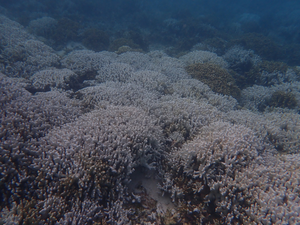Taipei: Local environmentalists have expressed concern about a large-scale coral bleaching in the southern and eastern waters off the coast of Taiwan, which has been occurring since June due to a prolonged heat wave.
Elaine Chen, Secretary-General of Taiwan Eco-Angel Environmental Conservation Association, told local media that divers have detected coral bleaching in waters off the coast of Kenting in southern Taiwan as well as around Little Liuqiu, Orchid, and Green islands since June.
Taiwan Loo-Koo Yu Association, another environmental nongovernmental organisation, also reported instances of coral bleaching in June and July, reports Xinhua news agency.
When the seawater temperature exceeds 28 degrees Celsius for two weeks, symbiotic algae within coral polyps emit toxins that are harmful to coral polyps, causing them to expel from the coral and revealing transparent coral polyps with white coral skeletons. The phenomenon is commonly known as coral bleaching.
According to Lee Kun-hsien, a volunteer with the Taiwan Loo-Koo Yu Association, the seawater temperature around Little Liuqiu Island typically ranges from 28 to 29 degrees Celsius during the summer, but it has consistently been between 30 to 32 degrees Celsius since June of this year.
He warned that if high temperatures persists after bleaching, corals are likely to die.
The previous large-scale coral bleaching around Taiwan occurred in 2020. Bleaching will result in short-term harm to coral reefs but with time and a favorable environment, most healthy and stable coral reefs will gradually recover.
Noting that bleached coral reefs are extremely vulnerable, environmentalists have called for reduced human activities near the reefs and greater measures to prevent and control seawater pollution.
According to Lu Shiau-yun, chief of the island’s ocean affairs department, a draft of a coral conservation action plan is being developed and is expected to be released this year or the next. She said that the department is collaborating with academic institutions to continue monitoring this issue.
–IANS


Comments are closed.